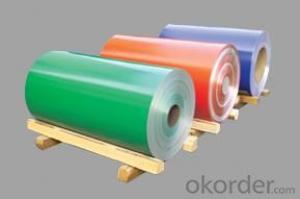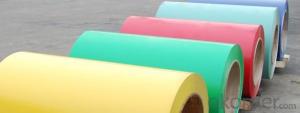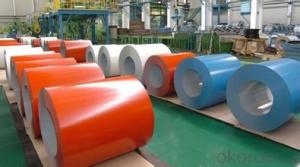Pre-painted aluminum coil in blu
- Loading Port:
- China Main Port
- Payment Terms:
- TT OR LC
- Min Order Qty:
- -
- Supply Capability:
- -
OKorder Service Pledge
OKorder Financial Service
You Might Also Like
Aluminium is a relatively soft,durable, lightweight, ductile and malleablemetalwith appearance ranging from silvery to dull gray, depending on the surfaceroughness. It is nonmagnetic and does not easily ignite. A fresh film ofaluminium serves as a good reflector (approximately 92%) of visible light and an excellent reflector (asmuch as 98%) of medium and far infrared radiation. The yield strengthof pure aluminium is 7–11 MPa, while aluminium alloys have yield strengths ranging from200 MPa to 600 MPa. Aluminium has about one-third the density and stiffness of steel.It is easily machined, cast, drawn and extruded.
Aluminium alloys (or aluminum alloys; see spellingdifferences) are alloysin which aluminium(Al) is the predominant metal. The typical alloying elements are copper, magnesium,manganese,silicon,tin and zinc. There are twoprincipal classifications, namely casting alloys and wrought alloys, both of which are furthersubdivided into the categories heat-treatableand non-heat-treatable. About 85% of aluminium is used for wrought products,for example rolled plate, foils and extrusions.Cast aluminium alloys yield cost-effective products due to the low meltingpoint, although they generally have lower tensile strengthsthan wrought alloys. The most important cast aluminium alloy system is Al–Si,where the high levels of silicon (4.0–13%) contribute to give good castingcharacteristics. Aluminium alloys are widely used in engineering structures andcomponents where light weight or corrosion resistance is required
Secification:
Alloy: AA1050, 1060, 1100, AA3003, 3005, 3015, 5052,5754, 5083,8011, etc
Temper: H14/16/18/22/24/32,HO etc.
Thickness: 0.2mm—100mm
Width: 100mm—2300mm (Can be slitted)
Inner Diameter:508MM
Coil Weight:500kg-3000kg(Max.)
Application:Foil stock, Circles, Roofing, Can stock, Marine plate,Anti-slipery purpose in vehicles, packing and appliance.
Features:
1. Excellent quality of products
2. Quick delivery
3. Best service to clients
4. BV,SGS avalible
5. No buckle o waveness
6. Tension leveling
7. Certificate of Origin
8. Form A,E
Packaging Detail: Carton ,Wooden pallet with plastic protection packing,standard seaworthy packing or as your request.
ProductionCapacity:
AnnualProduction capacity of 600,000 tons.
Products areexported to United States, Canada, U.A.E, Brazil, Mexico,Thailand, Vietnam,Nigeria etc, over 100 countries andregions all over the world.
Coveredfactories with full production line
CNBM aluminumproduction base is comprised of 18 aluminumannealers, 10 coil and foilmills, 4 continuous production lines, 2hot rolling production line and 3prepainted lines.
FAQ:
1. What is the form of payment?
Normally 30% TT, L/C
2. Type of quotation?
FOB, CFR, CIF
3. Port of loading?
Shanghai port
4. Delivery time?
30 day after client’s deposit
- Q:What are the potential applications of patterned aluminum coils?
- Patterned aluminum coils have a wide range of potential applications in various industries. They can be used for decorative purposes in architecture and interior design, such as wall cladding, ceilings, and facades. Additionally, they are commonly utilized in the automotive industry for decorative trims, grilles, and exterior body parts. The patterned coils can also be used in the manufacturing of household appliances, furniture, and electronics, providing aesthetic enhancements and durability. Furthermore, they have potential applications in packaging, signage, and advertising, as well as in the production of heat exchangers and radiators. Overall, the applications of patterned aluminum coils are diverse and offer a versatile solution for both functional and decorative purposes.
- Q:Can aluminum coils withstand extreme temperatures?
- Aluminum coils have gained a reputation for their remarkable capability to endure extreme temperatures. With a melting point of 660.32°C (1220.58°F), aluminum proves to be an ideal material for tasks demanding heat resistance. HVAC systems, for instance, frequently employ aluminum coils that are exposed to both high and low temperatures. Similarly, automotive radiators rely on aluminum coils to withstand elevated operating temperatures. Moreover, the outstanding thermal conductivity of aluminum enables efficient heat transfer away from the coil, further bolstering its ability to withstand extreme temperatures. All in all, aluminum coils stand as a dependable and long-lasting option for applications that necessitate resistance to severe temperature conditions.
- Q:Are aluminum coils suitable for roofing?
- Absolutely, roofing can indeed make use of aluminum coils. Aluminum, a material highly durable and lightweight, has found extensive application in the construction sector for roofing. It presents numerous advantages, including resistance against rust, corrosion, and fire, rendering it an optimal choice for regions enduring severe weather or heightened humidity. Furthermore, aluminum coils boast exceptional thermal conductivity, facilitating the reflection of sunlight and consequent reduction in energy consumption, thereby resulting in decreased cooling expenses. Moreover, the installation and maintenance of aluminum roofing are easily accomplished, ensuring enduring safeguarding for residential, commercial, and industrial structures.
- Q:How are aluminum coils protected against oxidation during storage?
- There are various methods used to protect aluminum coils against oxidation during storage. One commonly used approach involves applying a protective coating to the surface of the coils. This coating creates a barrier that prevents oxygen from coming into contact with the aluminum and causing oxidation. The coating may consist of a thin layer of oil or a specialized protective film. Another method involves storing the coils in a controlled environment with low humidity. This is because moisture in the air can accelerate the oxidation process. By keeping the coils in a dry environment, the risk of oxidation can be reduced. Furthermore, aluminum coils can be stored in airtight packaging, such as plastic wraps or vacuum-sealed bags. This further minimizes exposure to oxygen, thereby preventing oxidation. It is crucial to handle the coils with care during storage to avoid any damage that could potentially expose the aluminum to the air. Proper packaging and stacking techniques are essential to ensure that the coils remain protected. In conclusion, a combination of protective coatings, controlled environments, and proper handling techniques are employed to safeguard aluminum coils against oxidation during storage.
- Q:I have a couple aluminum baking sheets, and when i wash them, then dry them with a towel, it turns the towel black? why is this? are these still ok to use? Ive been putting one of those silicone baking sheets or parchment paper on the sheets because of this. but i cant really do that with the cake pan. so how do i stop it from doing this?
- Aluminum reacts to anything acid and a lot of dishwashing detergents are on the acidic end of the ph scale and that causes oxidation which is the black stuff you're getting on the towel. I use commercial aluminum baking sheets when I bake. I like their heavy weight, even browning and NO burnt cookie bottoms. Hot water and a tiny, tiny bit of dishwashing detergent works to clean them. The less you expose the sheets to acidic things, the less black stuff you have. To remove it, I just take one of those sponges with a nylon scrub pad that's safe for non-stick cookware and give it a scrub. I don't soak my baking sheets or put them in the water; I put a drop of the dishwashing soap on the sponge, work it into a foam, wash and rinse quickly. Barkeeper's Friend works well on anything the dishwashing liquid won't take off also. It's normal for the type of material it is but what you use to clean them does make the problem worse. If you don't create the black stuff, you don't have the problem.
- Q:How do I deal with too much aluminum powder when the aluminum strips are divided?
- For example, the wind speed control did not meet the requirements, or not in accordance with the explosion-proof ventilation system requirements set, including pipeline setting, setting, filter series parallel is the selection of explosion-proof, whether Mars and extinguishing measures.
- Q:What are the potential environmental impacts of aluminum coil production?
- The potential environmental impacts of aluminum coil production can be classified into several categories. Firstly, the extraction of aluminum from bauxite ore requires significant energy inputs and can contribute to greenhouse gas emissions. The process also involves the use of toxic chemicals, which if not properly managed, can contaminate nearby water sources and soil. Furthermore, the manufacturing of aluminum coils involves various stages such as smelting, rolling, and annealing, each of which has its own environmental implications. Smelting, for example, releases air pollutants like sulfur dioxide, nitrogen oxides, and particulate matter, contributing to air pollution and potentially causing respiratory issues for nearby communities. Additionally, the rolling process consumes a significant amount of electricity, which may be derived from fossil fuel sources, leading to further greenhouse gas emissions. The use of water in cooling and cleaning processes can also strain local water resources if not properly managed. Transportation is another factor to consider. Aluminum coils are often transported over long distances, which can contribute to carbon emissions from the burning of fossil fuels in trucks or ships. Lastly, the disposal of waste generated during the production process, such as scrap metal or chemicals, needs to be carefully managed to prevent pollution of landfills or nearby ecosystems. To mitigate these potential environmental impacts, companies can adopt various strategies. These include investing in more energy-efficient technologies, promoting recycling and circular economy principles to reduce the need for primary aluminum extraction, implementing cleaner production techniques, and ensuring proper waste management and pollution control measures are in place.
- Q:Hi,I am fairly new to design and have been doing technical drawing for only a few months. We have an item, that supports up to about 800KG of weight, as a C shaped channel. We are currently making this out of 3mm Mild Steel. Due to a new design, we are changing this design to avoid welding and painting the above part. This means we will be making the part from Galv sheet.I would like to make the part from Aluminium because 1) There will be no rust, 2) I think it will look better than Galv sheet but I need to keep the cost down.We use 3mm mild at the moment, because it is easier to weld than 2mm, not for strength really.Therefore, my question is, in everybody's opinion, would it be OK to make it from 2mm Aluminium, or is this likly to end in disaster?FYI, the part is 1600mm long, then on each long side there are presses of up 250mm, down 80mm and down 20mm. The weight is supported at 4 points on the 80mm flanges.What a question for my first go Answers! TIA
- Aluminum is not as strong as steel, so you would need a thicker piece. Also you need to select the aluminum alloy to match the application, there are many different alloys. And Al is more expensive than steel, so you have to look at your cost budget. Galvanized will not rust, so your only reason is looks? Not a decision for you to make, but for the customer.
- Q:Can aluminum coils be used in water treatment plants?
- Aluminum coils have a wide range of applications in water treatment plants due to their corrosion resistance and efficiency in heat transfer. They are commonly used in heat exchangers and condensers for optimal heat transfer. In water treatment plants, aluminum coils serve various purposes. For instance, they are utilized in cooling towers to effectively remove heat from water by circulating it over the coils. This process facilitates the transfer of heat from the water to the surrounding air, resulting in the cooling of the water. Moreover, aluminum coils are also employed in the construction of evaporators, which aid in the evaporation of water during the treatment process. These coils are designed to have a large surface area, maximizing contact between the water and the aluminum surface to enhance evaporation efficiency. Additionally, aluminum coils play a crucial role in air handling units (AHUs) within water treatment plants. AHUs help regulate temperature, humidity, and air quality in the facility. The aluminum coils in AHUs contribute to the overall efficiency of the system by cooling or heating the air passing through them. However, it is important to consider the compatibility of aluminum with the specific water being treated. Certain water compositions, such as those with low pH or high levels of certain chemicals, can cause corrosion or chemical reactions that may affect the performance and durability of aluminum coils. Therefore, it is essential to assess the water composition and seek guidance from experts or manufacturers to ensure the suitability of aluminum coils for a particular water treatment application.
- Q:... of aluminum atoms?(mole = 6.022x10^23)
- My lady I nevertheless use it to cook dinner my hams and turkeys and to save nutrition interior the frig, yet its growing to be a dinosaur and its on its final leg and there is unquestionably one of those super form of different issues now we are able to apply yet interior the previous years it had its use yet technology and Tech. has come and made it out of date. yet nevertheless i like to apply it on ocassions
1. Manufacturer Overview |
|
|---|---|
| Location | |
| Year Established | |
| Annual Output Value | |
| Main Markets | |
| Company Certifications | |
2. Manufacturer Certificates |
|
|---|---|
| a) Certification Name | |
| Range | |
| Reference | |
| Validity Period | |
3. Manufacturer Capability |
|
|---|---|
| a)Trade Capacity | |
| Nearest Port | |
| Export Percentage | |
| No.of Employees in Trade Department | |
| Language Spoken: | |
| b)Factory Information | |
| Factory Size: | |
| No. of Production Lines | |
| Contract Manufacturing | |
| Product Price Range | |
Send your message to us
Pre-painted aluminum coil in blu
- Loading Port:
- China Main Port
- Payment Terms:
- TT OR LC
- Min Order Qty:
- -
- Supply Capability:
- -
OKorder Service Pledge
OKorder Financial Service
Similar products
New products
Hot products
Hot Searches
Related keywords






























